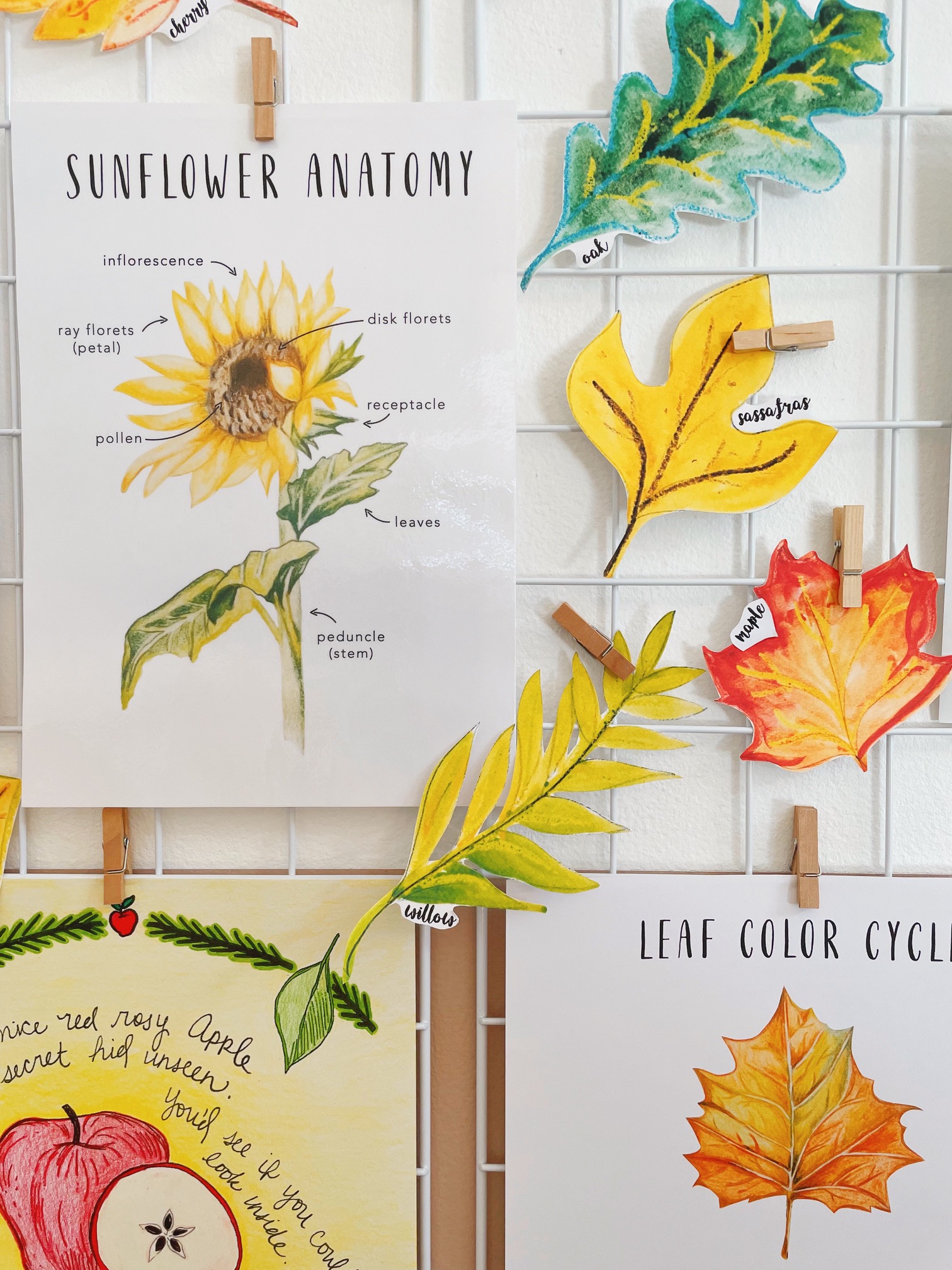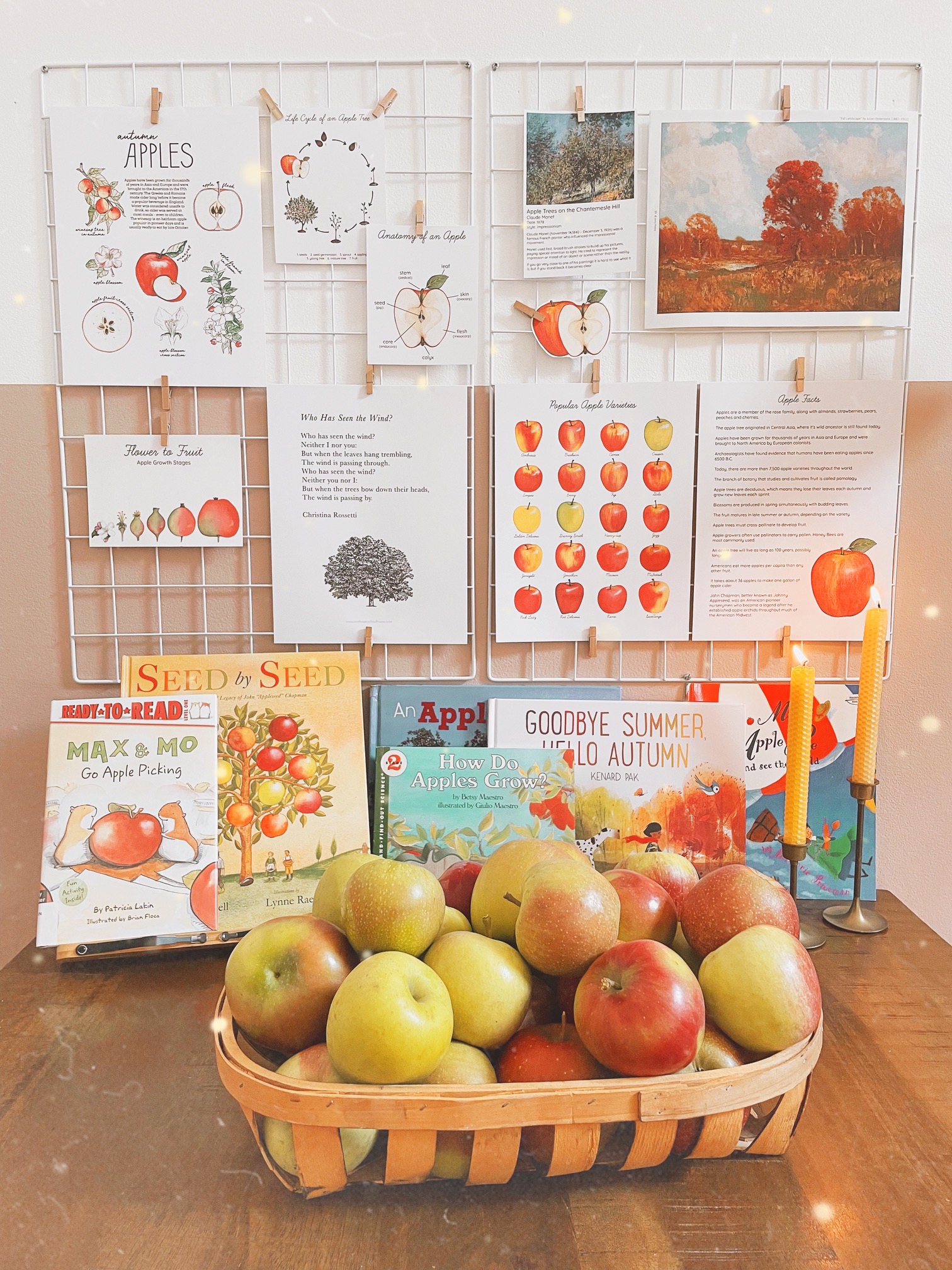i don't know about you, but we love unit studies!
they're a fun way to dive into any subject or topic of your choice and explore.
for us, a new season is the perfect time to add a unit study to our lesson plans. we live in ny where you get to enjoy all four seasons and each of those seasons brings so many different topics you can explore with your children.
autumn is a time where we enjoy learning about the changing leaves, sunflowers, acorns, apples, pumpkins and so much more!
unit studies are one of those things that i feel gives you the freedom and space to be creative in your approach when teaching your child about a topic. you can teach them outdoors, at a museum, through literature, printable materials, games... i could go on and on.
today i'm sharing how i personally go about planning out our unit studies. but remember, there isn't a right or wrong way to go about lesson planning. it's all about what works for your family and your home school.
before our school year begins i like to plan out what topics i want us to cover through out the school year. i then break those topics up by quarters. i try to plan out topics that work for each season that way we can explore those topics in other ways such as through gardening, nature walks, field trips, etc.
here's the breakdown of what our school year will consist of for the 2022-2023 school year:
1st quarter - autumn (september - november)
anatomy of a deciduous tree
anatomy of a trunk
leaf identification/ changing leaves
north american trees/ bark
anatomy of a mushroom
life cycle of a mushroom
different types of mushrooms/ fungi
animals in the neighborhood - squirrels, woodchucks, raccoons and chipmunks
migration
2nd quarter - winter (january - mid march)
hibernation / adaptation
bears - grizzly bears vs. black bears
animal tracks
woodland animals
evergreens / conifers / pine cones
winter birds
owls
deer
arctic / antarctic animals - polar bears and penguins
the moon
the stars
the solar system
astronaut neil armstrong
3rd quarter - spring (end of march - may)
soil
seeds
plants
food from plants
plant life
butterflies / revisit migration
honeybees
ants
entomologist - jean henri fabre
spiders
turtles
earthworms
frogs vs. toads
4th quarter - summer (because we school year round) june - july
seahorses
octopuses
oceanographer - sylvia earle
world oceans
the breakup of pangea
waves
jellyfish
sea shells by the seashore
whales anatomy of a beach
coral reef
sea turtles
the great migration
after reading that breakdown i'm sure you have two questions in your head. one, why isn't december and august noted on the breakdown and two, why do we school year round? so here's a quick answer for both of those questions. december is a time where we like to focus in on the birth of jesus and the true meaning of the season. we love to spend our time baking, reading, crafting, visiting friends and family and just overall embracing the holiday season so we take most of december off to focus in on those things. learning is of course still happening because, well, life is still happening and there is plenty to learn in life skills! and the beginning of august we usually take a family vacation before we begin our new school year in mid august.
as for why we school year round, i have many reasons for that but the main one is that i'm not a fan of allowing my child to go from june through august with absolutely no learning going on. during that time children regress and forget so much of what that they have worked all year to learn. they also forget habits and rhythms that both parents and children have worked so hard all year to get used too. we've definitely had summers where we attempted to take off june - august but i truly just didn't find it to be beneficial to us at all. when we started school again in september there was so much my son had forgotten and rhythms/ systems that we had to implement all over again, so for our family that long summer break just isn't for us. however, don't be fooled, for those of you who may be thinking that because we school year round we're covering every subject, every day and have our heads in workbooks all day, well that's so far from the truth and from how we school. learning is happening in a very relaxed environment in our home. we review skills that we learned over the year with games, flash cards and hands on activities. we take tons of field trips, visiting museums, aquariums, zoos, etc. and this summer i have chosen to focus in on a unit study of the ocean. we'll be diving into different topics which i noted above under "4th quarter - summer" and we'll even be participating in some programs with our local beach and environmental center. we will also be sending our son to summer camp as we do every summer. so remember, learning doesn't just have to happen within 4 walls surrounded by textbooks and workbooks!
so back to planning...
once i've decided on a topic i want to cover, the first thing i like to do is shop our home school for materials. what i mean by that is that i go through our entire home school space to see what materials we may already have available on this topic such as books, printable materials, games, flash cards, etc.
once i've done that i like to search our local library catalog to see what books they have available on the topic. i also like to do a search on amazon because i love reading other parents reviews on books and amazon also gives more details and sometimes even flip throughs of books.
after i've found books on the topics, i like to brain storm field trips we could possibly take to explore our topic more in depth giving us visuals and bringing the topic to life! field trips are a favorite around here!
next up are printable materials. there are so many great printable materials out there on different topics. etsy is usually my go-to, to purchase printable materials. i also follow lots of amazing mamas on IG that have their own small shops where they sell printable materials they design themselves.
here are some of my favorite printable material shops to shop at:
once i've gathered all of the materials i plan on using to cover the topic, i like to setup our grid with some of the printable materials and a couple books on the topic as well. if the topics happen to be something we can have in our home such as acorns or pumpkins then i like to add that to the space as well.
i also like to try and find artwork on the topic. so for example, when we covered sunflowers this year i used artwork by vincent vangogh for picture study. it allows us to expand our studies and keep things interesting when exploring all areas of the topic.
another thing we enjoy adding to our unit studies are videos. youtube is a great resource to find educational videos on different topics. we've even found some great documentaries on disney +.
and last but not least, i like to find a way to connect that topic with our faith. i'll use our bible to find a story that may mention a topic or a devotional such as, how great is our god by louie giglio which dives into many topics that connect to the bible.
once all of that is planned out, it's time to have some fun and dive in! we don't put timelines on how long we'll stay on a topic. we like to take our time and explore the topic as much as we like and sometimes we even revisit it.
"education is an atmosphere, a discipline, a life" i couldn't agree more with ms. charlotte mason. this is a motto that i truly build our home school upon and wouldn't want it any other way.
i hope this post helps you with your unit study planning or perhaps plants a seed for how you would like to plan your unit studies in the future. as always, if you have any questions please don't hesitate to reach out either in the comment section below or via email which you can find on my contact page.
happy planning!





0 Comments